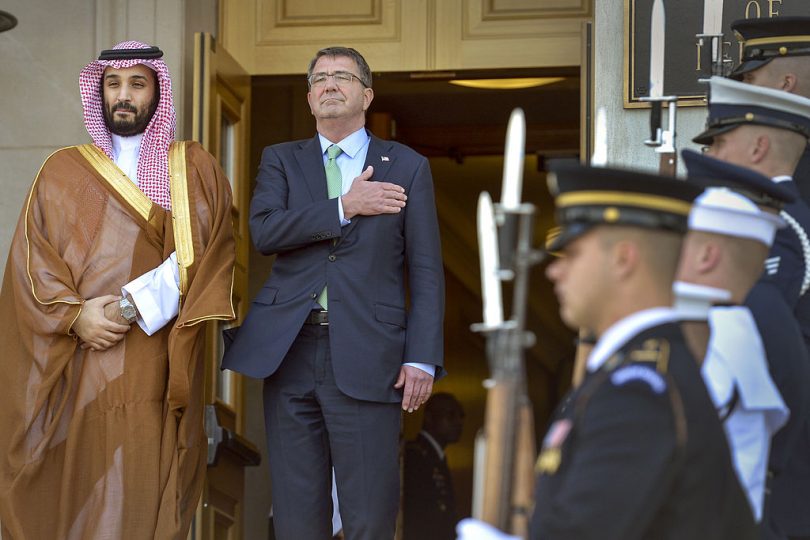Four congressmen recently sponsored a bill on blocking arms sales to Saudi Arabia, worth $1.15 billion and expected to generate over eleven thousand American jobs. They justified the bill by citing the conflict in Yemen—the worsening humanitarian situation as well as the harm to American national security.
I will argue here for three points. First, Saudi Arabia is not given enough credit for its commitment to the protection of civilians as well as for the humanitarian aid it provides to Yemen. Second, the bill neglects the strategic context that dictated the formation of the Arab coalition under Riyadh’s leadership and its intervention in Yemen. Third, it is of fundamental importance to American national security that Yemen has a strong central government and a stable as well as a functioning state structure. These are the objectives of the Arab coalition in Yemen.
Although it is important to call on the Saudis to respect humanitarian standards, Saudi Arabia is in fact making serious efforts to reduce civilian casualties and provide aid to Yemen. The U.S. military can attest to this given that it has a front seat in the command center of the Arab coalition forces in Riyadh. One major reason for the slow advance of Yemeni government’s forces is that the Arab coalition wants to avoid civilian casualties. That is why many operations against Iran-backed Houthi militia and Saleh forces have not been carried out.
Moreover, according to the United Nations High Commissioner for Refugees (UNHCR), Saudi Arabia has received forty-one thousand Yemeni refugees, who were granted full access to the country’s public health and education facilities as well as to the labor market. As is the case with the five hundred thousand Syrian refugees currently residing in Saudi Arabia, Yemeni refugees are not called “refugees,” but rather, “visitors.” This is because of the historical sensitivity of the Arab world generally, and Saudi Arabia in particular, toward the word “refugee” since the Palestinian Nakba in 1948. According to UNHCR, Saudi Arabia has issued an extendable six-month stay permit to 465,400 undocumented Yemenis living in Saudi Arabia in order to facilitate their access to health services, education and the labor market. Saudi Arabia recently announced that 285 thousand Yemeni students are currently enrolled in free public schools in Saudi Arabia, as are 141 thousand Syrian children. And of the $730 million donated as humanitarian aid to Yemen in 2015, Saudi Arabia contributed $253.1 million (34.6 percent). Countries who host Yemeni refugees receive aid from Saudi Arabia too. It has provided Djibouti, for example, with over $13 million and constructed three hundred houses for Yemeni refugees there.
Secondly, the bill neglects the international, regional, and internal strategic context that led Saudi Arabia to form the Arab coalition and intervene in Yemen. The U.S. “pivot to Asia” is creating a strategic vacuum in the Middle East. U.S. allies feel that Washington is no longer a reliable ally, and that they have no choice but to take matters into their hands.
This international context has amplified serious threats in the Middle East, notably Iranian expansionism. Due to its isolation and economic sanctions, Iran has not been able to rely on the usual tools of the nation-state to influence players in the international arena. Consequently, Tehran resorts to non-state actors, such as Asaib Ahl al-Haq in Iraq, Hezbollah in Lebanon, Al-Abdali Cell in Kuwait, and the Houthis in Yemen. To build alliances with these non-state actors and influence their behavior, Iran has relied on sectarianism as a tool. Hence, it is no coincidence that all these militias are affiliated with Shia Islam. In order for these non-state actors to be effective in recruitment and mobilization, there must be a heightened sense of sectarian identity, which they can achieve through sectarian conflicts. In addition, central governments must be weakened and systematically undermined, or else non-state actors would not be effective. As a revisionist regional actor, Iran thrives on sectarian conflicts and weak central governments, which tend to mark Iran’s zones of influence. And that is a grave threat to the territorial integrity as well as the security of the Arab world at large, and to Saudi Arabia in particular.
Iranian policy reduces the nation-states of the Arab world into sects, Sunnis and Shia. Only “being sects” can allow Iran to wield a considerable influence in each Arab state’s internal politics, thus influencing their foreign policy. And certain Western governments have become, unconsciously, active agents in the service of Iranian expansionism. For the Arab world, Western reducing and debasing of Arab states into mere Sunni sects is viewed as another Sykes-Picot.
Original Article



![Torrential rain hit Sanaa and most parts of Yemen as summer temperatures soar. [Yahya Arhab/EPA]](../../../../wp-content/uploads/80879bd0783c4f559e823e698494ed8f_8-145x100.jpg)



